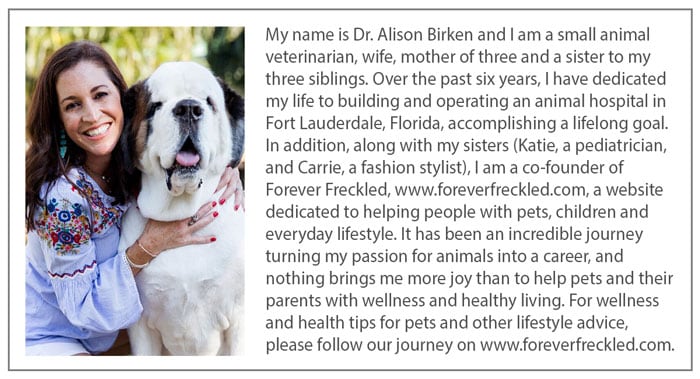Contributed by Dr. Alison Birken, owner and DVM of Victoria Park Animal Hospital.
Even if we love the things that winter brings (like the holidays), we don’t always enjoy the cold weather and staying indoors, and our furry friends especially don’t. As spring approaches and we all look forward to the wonderful warmer weather, open grass fields, trips to the park, and long blissful walks and runs, we veterinarians also prepare the not-so-wonderful spring hazards. As a small animal veterinarian, I see an influx of itching pets, fleas, ticks and certain seasonal poisons. Let’s take a moment to discuss how to prepare your pet for spring and what to do to keep your pets safe and happy during the season of perfect weather.
Allergies
Spring is the time of year for allergies, which brings itching dogs and cats. Pets suffer from skin breakouts and itching when they have pet health allergies to natural factors such as pollens, grasses and plants. Luckily, there are many great treatment options for our suffering pets. Vet’s Best Seasonal Allergy Dog Support Dog Supplement is a good option to help support skin health to protect your pet against environmental allergies. Speak with your veterinarian regarding which type of prevention or treatment is best for your pet’s health.
Easter Treats and Decorations
Did you know that Easter lilies (Lilium longiflorum) are toxic for our pets? These beautiful and common household plants can cause toxicity and illness, so please make sure to keep them well out of reach of your furry friends. In fact, keep the whole Easter basket stowed away, because the fake plastic grass that is used as a lining is very tempting to pets but also very dangerous to pet health if eaten. Chocolate is common this time of year, especially during the Easter holiday, and it should be kept out of reach of curious noses. If your pet has ingested chocolate or lilies, please contact your veterinarian immediately for pet health treatment.
Ticks and Fleas
Just like us, ticks and fleas love the warm weather. Fleas not only cause itching and secondary skin infections, but they also transmit tapeworms, a gastrointestinal parasite. Ticks can spread several different diseases that affect both pets and people. Monthly tick and flea prevention is imperative to prevent disease and keep our pets safe. Try K9 Advantix II Flea & Tick Treatment for Large Dogs for broad spectrum flea control and protection against ticks and mosquitoes, too. Make your home a safe haven away from fleas and ticks with Vet’s Best Flea + Tick Home Spray, which is safe to use on home surfaces like furniture, bedding, carpets, flooring, and countertops. Ask your veterinarian which flea and tick control product is best for your pet.
Bufo Toads
This is for all my Florida pet parents. Unfortunately, spring and summer bring the Bufo toads. In South Florida, I see many Bufo toad toxicities, which can be very scary. These toads excrete poison onto their skin, and pets are poisoned when they lick or eat them. They are very dangerous—if enough poison is ingested, Bufo toad toxicity can be fatal. Contact your veterinarian immediately if you suspect your pet had an encounter with a Bufo toad. Early treatment is extremely important and can be lifesaving.
Snakes
With the warm weather, our pets are outdoors more, and so are the snakes. Dogs tend to sniff around bushes or on the ground where snakes are hiding. Please be aware of the type of snakes—especially the venomous species—that are common to your area, and remain on the lookout. A venomous snake bite is a life-threatening emergency that needs treatment from your veterinarian (or emergency vet) immediately.
Heartworm
Heartworm disease is transmitted by mosquitoes, which breed and flourish during the warmer times of the year. Heartworm disease is a serious and sometimes fatal disease that primarily affects the heart and lungs, but can also affect the liver, kidney, eyes and central nervous system. The treatment is costly and strenuous on our pets. Monthly heartworm prevention is safe and important to prevent disease and keep them safe. Talk to your vet about which prevention is best for your pet.
Fertilizers and Mulch
Spring is wonderful for gardening and being outdoors. I always advise my pet parents to be conscientious of the fertilizers they use, because most contain a wide assortment of potentially toxic substances, including iron and nitrogen. Fertilizers may also have pesticides, fungicides or herbicides. Please inquire about the fertilizers you use and whether they are poisonous for your pets.
Antifreeze
Antifreeze is a coolant used to prevent car engines from overheating. Pets love to lick antifreeze because it has a sweet smell and taste. Antifreeze is dangerous if ingested and is one of the most common forms of poisoning in pets. Make sure to keep it well out of reach, and if your pet does ingest some, contact your veterinarian immediately. Early treatment can save your pet’s life.
Thawing Ponds
As the ice begins to thaw in lakes, rivers and ponds, it’s not going to be obvious to your pets who spent the winter months walking on it while it was frozen. Please make sure to keep your pets on a leash while walking them outside near thawing bodies of water. Try PetSafe Easy Walk Dog Harness for a comfortable and enjoyable walk for both you and your pup.
Enjoying the Good Old Outdoors
Everyone loves longer walks, trips to the park, and car rides during the warmer time of year. But being outdoors means a greater chance of your pet wandering off. I always recommend having your pet microchipped for identification, which is registered with your home address, cell phone and any other relevant contact information. I have returned so many lost pets with microchips to their loving homes.
I hope this helps all my pet parents out there be more aware of possible springtime pet hazards. So please enjoy the beautiful weather with your pets, but do so with caution. My goal is to keep our pets safe and healthy. As much as I love seeing them walk through the doors of my animal hospital, I prefer to help avoid “sick” trips to the veterinarian! If you have any questions or concerns, you should always visit or call your vet. They are your best resource to ensure the health and well-being of your pets.

Share:













